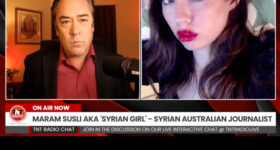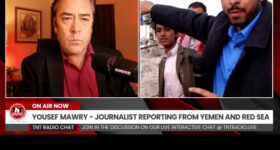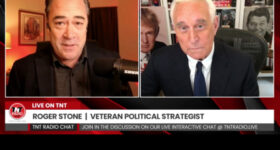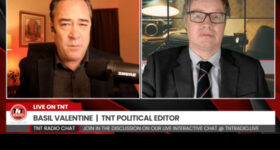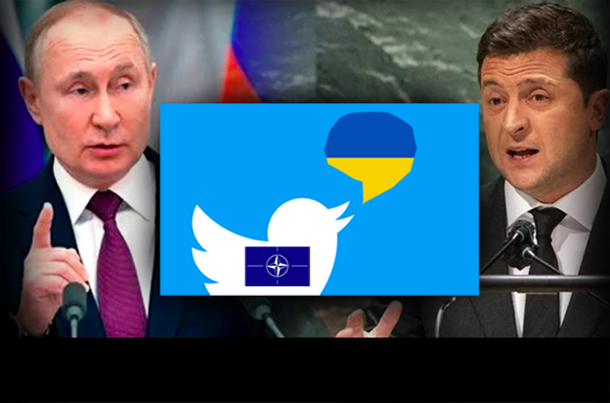
Censorship giant Twitter has announced that it will increase its policing of any posts about the war in Ukraine, as it releases a new round of thought speech policies designed to ‘reduce amplification’ of any opinions from persons or independent media outlets which the Big Tech firm considers ‘untrustworthy’ sources.
In addition, Twitter will be actively shielding its global users from any news sources which it considers to be affiliated with a ‘Russian state media source’, in its attempt to shape public opinion by controlling the conversation on its platform to reflect NATO and western mainstream media’s preferred narrative of the conflict.
Critics of Twitter have accused it of systematically suppressing any reporting which depicts Ukrainian war crimes, and promoting any reports which accuse Russia of wrong doing – a decidedly partisan approach which effectively transforms the platform into an extension of the US and NATO’s information warfare military operations.
Previously, Twitter had taken a leading role in sanitizing global speech relating to COVID-19 and the experimental mRNA gene-based vaccines, rigidly enforcing speech to reflect government ‘public health’ policies and corporate pharmaceutical industry claims. Since the beginning of the Covid crisis, it is believed that Twitter has erased tens of thousands of user accounts, including many large well-known personalities and journalists, as part of its information cull relating to Covid and vaccines.
As Ukraine and NATO continue to lose ground in their war against Russia, how long will Twitter be able to filter-out inconvenient information and commentary, as well as other on-the-ground reporting from Ukraine by applying the arbitrary label of ‘Russian disinformation’?
RT International reports…
Twitter rolled out an update to its “crisis misinformation policy” on Thursday, saying it will put a warning label on posts about the conflict in Ukraine that fit certain criteria, limiting their ability to be seen, shared or liked. The announcement comes just a day after the resignation of US government’s “disinformation czar” Nina Jankowicz, who had advocated for the ability to edit other people’s tweets.
The policy will be applied globally and guide Twitter’s efforts to “elevate credible, authoritative information,” and “help to ensure viral misinformation isn’t amplified or recommended by us during crises,” said Yoel Roth, the company’s head of Safety and Integrity.
As soon as there is evidence that something posted “may be misleading,” Twitter will label it with a notice and won’t amplify or recommend it in the Home timeline, Search, and Explore tabs. Warning notices will be prioritized for “high profile accounts” such as those designated “state-affiliated media,” verified users, and official government accounts.
Declaring something misinformation will require “verification from multiple credible, publicly available sources, including evidence from conflict monitoring groups, humanitarian organizations, open-source investigators, journalists, and more,” Roth added.
As examples, Roth cited “false coverage or event reporting, or information that mischaracterizes conditions on the ground as a conflict evolves,” false allegations regarding “use of force, incursions on territorial sovereignty, or around the use of weapons,” as well as “demonstrably false or misleading allegations of war crimes or mass atrocities against specific populations” and falsehoods regarding “international community response, sanctions, defensive actions, or humanitarian operations.”
However, “strong commentary, efforts to debunk or fact check, and personal anecdotes or first person accounts” will be exempt.
The company’s Help Center page on the policy distills the definitions even further, making clear that Twitter will go after posts that have “the capacity” to “serve as a pretext for further aggression” or “lead to increased humanitarian needs,” disrupt ceasefire talks or “incite the targeting or surveillance” of groups based on political, religious, ethnic or ideological affiliation or membership, or protected by international humanitarian law.
To be labeled, a post has to state a claim or fact “expressed in definitive terms,” be “demonstrably false or misleading, based on widely available, authoritative sources” and “be likely to impact public safety or cause serious harm,” according to Twitter.
The policy is focused on “international armed conflict” such as Ukraine, but Twitter plans to update and expand it to any crisis as defined by the UN, Roth explained…
Continue this story at RT International
ALSO JOIN OUR TELEGRAM CHANNEL
READ MORE UKRAINE NEWS AT: 21st Century Wire Ukraine Files
SUPPORT OUR INDEPENDENT MEDIA PLATFORM – BECOME A MEMBER @21WIRE.TV

Get Clive de Carle's Natural Health essentials of the finest quality, including vitamin & mineral supplements here.









